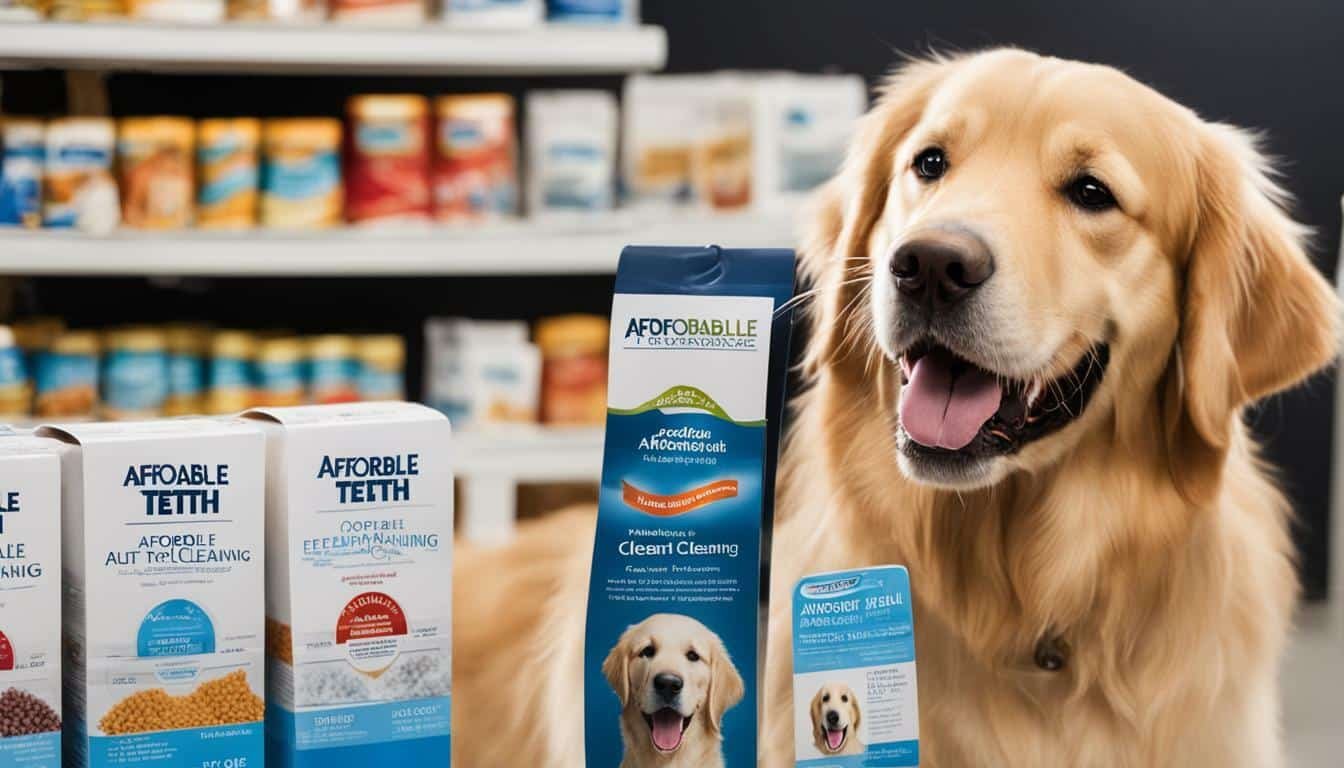As pet owners, we all want to provide the best for our furry friends, including a healthy and balanced diet. However, one question that may come up is whether or not small dogs can safely consume fresh pumpkin seeds. Pumpkin seeds are a popular snack and a rich source of nutrients, such as protein, healthy fats, fiber, and minerals like zinc, magnesium, and iron.
In this blog post, we will discuss the benefits of pumpkin seeds for dogs and how to properly add pumpkin seeds into their diet, including the things to consider before giving them to your dog. Join us as we explore whether pumpkin seeds can be a healthy addition to your dog’s regular diet.”
Can Dogs Eat Pumpkin Seeds and Reap the Benefits?
Pumpkin seeds are a healthy and nutrient-dense snack, but can dogs also eat them? The answer is yes. Dogs can safely eat a few pumpkin seeds. These raw seeds are a great source of protein, healthy fats, and fiber. They also contain vitamins and minerals such as zinc, magnesium, and iron. However, it is important to note that plain pumpkin seeds should be given to dogs in small amounts and should always be unsalted, roasted, and de-shelled. In addition, dogs with pancreatitis or other digestive issues should avoid pumpkin seeds as they are high in fat.
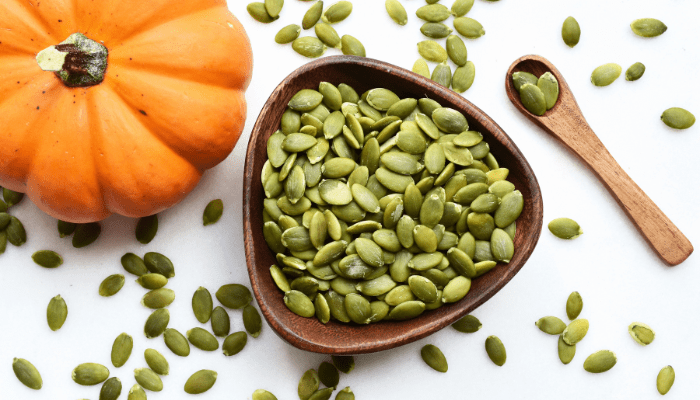
Are Pumpkin Seeds Good for Dogs?
Peeled pumpkin seeds can be a healthy addition to a dog’s daily diet when given in moderation and prepared adequately. They are a rich source of protein, healthy fats, fiber, and minerals such as zinc, magnesium, and iron. The raw pumpkin seeds also contain antioxidants and phytosterols, which can benefit a dog’s health.
Additionally, pumpkin seeds can help improve skin and coat health as they contain essential fatty acids, which help to keep the skin moisturized and promote a shiny coat.
Nutrition of Pumpkin Seeds
People eat pumpkin seeds for a rich source of nutrition and provide a variety of beneficial nutrients such as:
- Protein: Pumpkin seeds are a good source of plant-based protein, which is essential for building and repairing muscle tissue.
- Healthy Fats: Pumpkin seeds are high in polyunsaturated and monounsaturated fats, which are important for maintaining heart health and reducing inflammation.
- Fiber: Pumpkin seeds are high in fiber, essential for maintaining a healthy gut, and helping to keep the digestive system regular.
- Minerals: Pumpkin seeds are a good source of minerals such as zinc, magnesium, and iron. Zinc helps with immune function and wound healing. Magnesium helps with the normal functioning of the nerve and muscles, and iron helps to transport oxygen throughout the body.
- Vitamin K: Pumpkin seeds are rich in Vitamin K, which is important for blood clotting and maintaining healthy bones.
- Phytosterols: Pumpkin seeds contain Phytosterols, naturally occurring compounds found in plants that have cholesterol-lowering properties
- Antioxidants: Pumpkin seeds are a rich source of antioxidants, including carotenoids, such as beta-carotene, and vitamin E. These antioxidants help protect the body’s cells from damage caused by harmful molecules called free radicals.
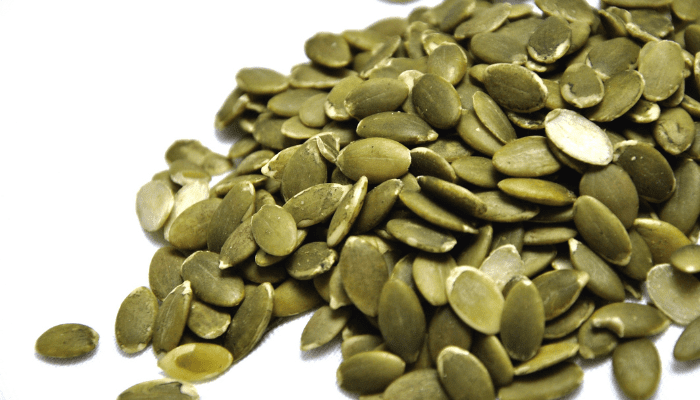
Health and Nutritional Benefits of Pumpkin Seeds
Vitamins E and K Can Improve a Dog’s Cardiovascular Health
Can dogs eat pumpkin seeds? Pumpkin seeds are a good source of vitamins E and K, which are important for maintaining heart health. Vitamin E is a powerful antioxidant that helps protect the cardiovascular system against damage caused by free radicals, while vitamin K helps to keep the blood clotting properly. Together, these vitamins can help to reduce the risk of cardiovascular diseases in dogs.
Pumpkin Seeds Are a Natural Way to Fight Canine Parasites
Pumpkin seeds contain compounds called cucurbits, which have been shown to have anthelmintic properties. This means they can help to expel parasitic worms, such as tapeworms, from the dog’s intestinal tract. Additionally, the seeds contain certain minerals like zinc and magnesium, which play a vital role in immunity and help to fight against parasites.
Antioxidants and Fatty Acids in Pumpkin Seeds Improve the Urinary Health of Dogs
Pumpkin seeds are rich in antioxidants, including carotenoids, such as beta-carotene and vitamin E. These antioxidants can help to protect the urinary tract from damage caused by free radicals. Additionally, the fatty acids present in pumpkin seeds can also help to improve urinary health by maintaining the pH balance of urine and promoting the health of the bladder and urinary tract.
Pumpkin Seeds Contain Lipids That Provide “good” Fats to the Dog’s Body
Pumpkin seeds are high in polyunsaturated and monounsaturated fats, which are important for maintaining heart health and reducing inflammation. In addition, these healthy fats, known as omega-3 and omega-6 fatty acids, are important for maintaining a healthy immune system, promoting a shiny coat and moisturized skin.
Pumpkin Seeds May Help Dogs With Benign Prostatic Hyperplasia
Pumpkin seeds have been found to contain compounds called phytosterols, which can help to reduce the size of an enlarged prostate. This may benefit dogs suffering from benign prostatic hyperplasia, a common condition in older dogs.
Pumpkin Seeds Have Anti-inflammatory Benefits for Dogs
Pumpkin seeds contain compounds known as phytosterols and Omega-3 fatty acids, which have anti-inflammatory properties. This can help to reduce inflammation throughout the body, including in conditions such as arthritis and other joint issues. These anti-inflammatory properties can also help improve dogs’ overall health and wellness.
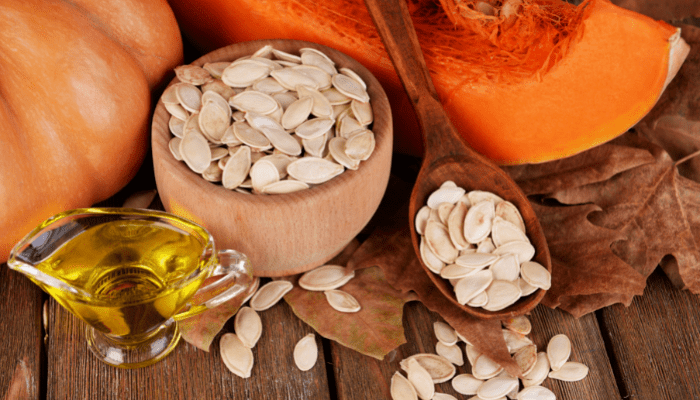
Risks of Feeding Your Dog Pumpkin Seeds
- High in fat: Can I give my dog pumpkin seeds? Pumpkin seeds are high in fat, which can cause digestive upset and pancreatitis in dogs if fed in large amounts. Dogs with pre-existing pancreatic or digestive issues should avoid pumpkin seeds altogether or provide them only in small quantities.
- Bloating: The high-fat content of pumpkin seeds can also cause bloating, which can be painful for your dog.
- Allergic Reactions: Pumpkin seeds, like any other dog’s food, could be a potential allergen for some dogs and may cause allergic reactions such as itching, vomiting, or diarrhea.
- Intestinal Blockage: If fed in large amounts or not correctly prepared, pumpkin seeds can be difficult for dogs to digest and may cause an intestinal blockage, which can be a severe health issue and requires immediate medical attention.
- Overdose of minerals and vitamins: Pumpkin seeds are high in minerals and vitamins, and feeding too many pumpkin seeds to your dog could lead to an overdose, which may lead to toxicity and potential health issues.
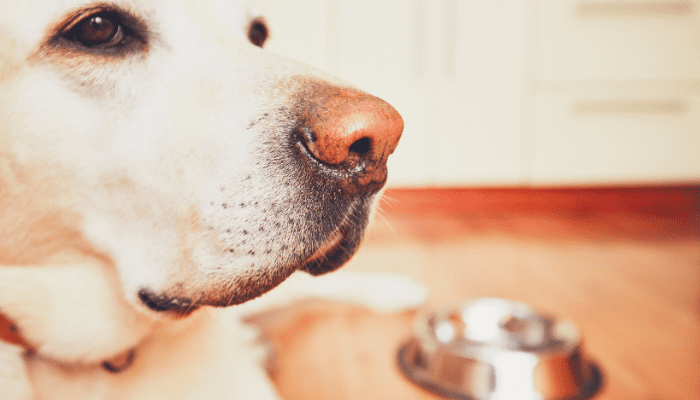
Feeding Pumpkin Seeds to Your Dog
How to feed pumpkin seeds to dog? Here’s a guide you can follow.
Moderation: Pumpkin seeds should be given to dogs in small amounts, as they are high in fat. A general guideline is to feed no more than a teaspoon per 10 pounds of body weight per day.
Preparation: Pumpkin seeds should always be unsalted, roasted, and de-shelled before being them to dogs, as raw or unroasted seeds can be difficult for dogs to digest and may cause intestinal blockage.
Grind the seeds: grinding the seeds make them easier to digest and will also help to release their nutrients more efficiently.
Introduce gradually: When introducing pumpkin seeds to your dog’s diet, it’s best to do it slowly to watch for any signs of allergic reactions or upset stomach.
Watch for any signs: Pay attention to changes in your dog’s behavior or health after giving them pumpkin seeds. If you notice anything unusual, discontinue use and consult with your veterinarian.
Pumpkin Recipe for Dogs
Here’s a simple recipe for a homemade pumpkin treat that your dog is sure to love:
Ingredients:
- 1 cup pureed pumpkin (canned or fresh)
- 1 cup whole wheat flour
- 1 egg
- 1 teaspoon baking powder
- One teaspoon of cinnamon (optional)
Instructions:
- Preheat your oven to 350 degrees Fahrenheit.
- In a mixing bowl, combine the pumpkin puree, egg, and cinnamon (if using) and mix well.
- Slowly add the whole wheat flour and baking powder, and mix until the dough comes together.
- Roll the dough out on a floured surface to about 1/4 inch thickness.
- Use a cookie cutter or knife to cut the dough into desired shapes.
- Place the treats on a baking sheet lined with parchment paper.
- Bake for 20-25 minutes or until the dog treats are golden brown and firm to the touch.
- Remove from the oven and let it cool completely before giving it to your dog.
This recipe can be modified depending on the dog’s dietary restrictions and preferences; for example, use gluten-free flour for a gluten-sensitive dog, or dog with an egg allergy, substituting the egg with unsweetened applesauce or mashed banana.
Also, you can add some lean protein like cooked chicken, turkey, or lean beef to increase the protein content of the treat.
You can store them in an airtight container at room temperature for up to a week or in the refrigerator for up to 2 weeks. You can also freeze them for up to 3 months.
Always supervise your dog when feeding them treats and give them in moderation as part of a well-balanced diet.
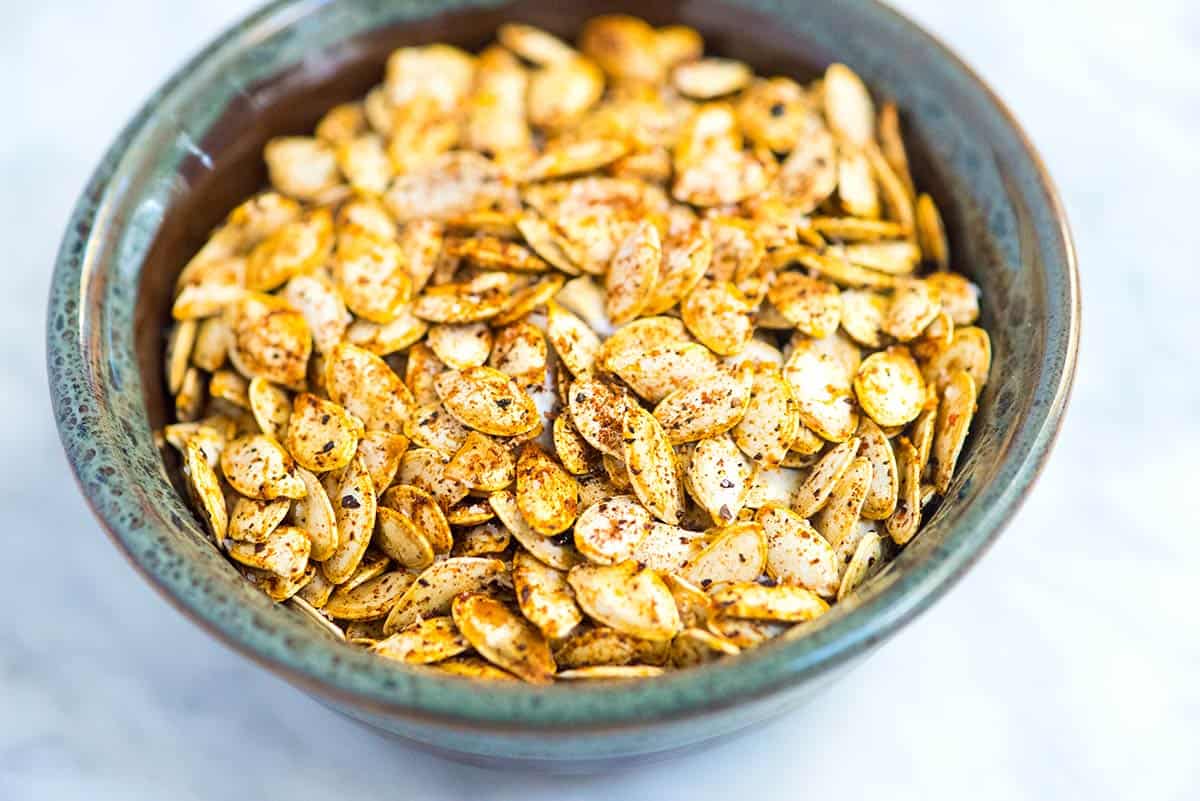
Final Thoughts
In conclusion, can dogs eat pumpkin seeds? Pumpkin seeds can be part of your dog’s diet in moderation. However, it is important to ensure that the seeds are properly prepared and given in small amounts, as they can cause bloating, allergic reactions, or intestinal blockage if not treated with care.
Also, try making some homemade pumpkin treats for your dog, as this is a great way to ensure that you provide them with the best nutrition possible. Ultimately, the most important thing is to be aware of your dog’s health and to always consult with your veterinarian if you have any concerns about their diet or well-being.
Frequently Asked Questions
What happens if a dog eats pumpkin seeds?
Pumpkin seeds are non-toxic and can be an enjoyable snack for your pup; however, moderation is key. Eating too many can cause stomach irritation as the hard outer shell can be difficult to digest. So if you decide to feed your pet pumpkin seeds, pay attention to any stomach discomfort they may experience.
How many pumpkin seeds can a dog eat?
If you have a pet, it's important to be mindful of the number of pumpkin seeds they consume. Despite being non-toxic, overuse can lead to serious digestive issues. Serve your pup up to three pumpkin seeds weekly in small amounts for optimal nutrition and safety.
Do pumpkin seeds deworm dogs?
Packed with cucurbits, an amino acid that acts as a laxative, pumpkin seeds can help to expel worms from your pup's system. Choose pure organic pumpkin seeds for the best results and feed in small amounts according to your puppy's size.
Can dogs eat pumpkin seeds and guts?
Fresh pumpkins are safe and nutritious for pets, including their "guts." However, rotting pumpkins can be hazardous to your pet's health so make sure they're fresh before you feed them. Pumpkin seeds can also be a special treat for your pup but keep in mind that they have a high fat content, so they should only be given in small amounts.






